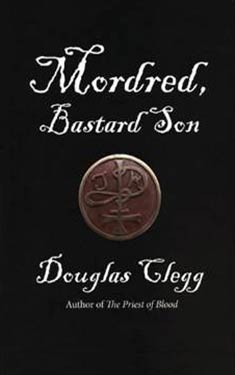Douglas
Clegg
Completed 6/18/2020,
Reviewed 6/18/2020
4 stars
This is a
twist on the story of Mordred from the Arthurian legend. The author tells you right at the beginning
that he plays loose and fast with the legend and does it very well. In this telling, Mordred is gay, and the
story takes you from his childhood to early adulthood. I really enjoyed this well-written story,
with beautiful prose and great characterization. I was sucked into the story quickly and
disheartened to find that the author never wrote the rest of his planned
series. The book is a quick read, and I
would have bought the other books.
Normally, Clegg writes horror and suspense, having won several awards in
that genre. This was his first venture
into pure fantasy and it got him a nomination for the Lambda Literary Award for
SF/Fantasy/Horror in 2007.
 The story
begins when Morgan is pregnant with Mordred after being raped by Arthur, her
half-brother. There is a prophesy that
Mordred will bring down Arthur’s kingdom if allowed to live. Arthur’s men pursue Morgan, forcing her to
leave the castle where she rules as Queen and flee to Gaul. There she stays with others from Britannia
who worship the same goddess and keep the pagan traditions. Mordred is born and grows up, is tutored by
Merlin, and falls in love with his best friend, who does not return his
love. When Morgan disappears and tries
to commit suicide, Mordred swears his chastity to three witches in return for
his mother’s whereabouts so he can save her.
Eventually he is tempted and forced to a terrible alternative promise
that again threatens her life.
The story
begins when Morgan is pregnant with Mordred after being raped by Arthur, her
half-brother. There is a prophesy that
Mordred will bring down Arthur’s kingdom if allowed to live. Arthur’s men pursue Morgan, forcing her to
leave the castle where she rules as Queen and flee to Gaul. There she stays with others from Britannia
who worship the same goddess and keep the pagan traditions. Mordred is born and grows up, is tutored by
Merlin, and falls in love with his best friend, who does not return his
love. When Morgan disappears and tries
to commit suicide, Mordred swears his chastity to three witches in return for
his mother’s whereabouts so he can save her.
Eventually he is tempted and forced to a terrible alternative promise
that again threatens her life.
The
narrative is told in first person by Mordred in a retrospective, relating the
story to a young monk who is hiding him from pursuers. It is mostly prose with some dialogue, though
the prose is beautiful to read and keeps the plot going at a good pace. Being told in first person, we get deep in
Mordred’s head, making it easy to empathize with him. He’s the victim of circumstance, never really
understanding his father’s wrath. He
must deal with his mother’s growing despair and depression, basically PTSD
after her rape and loss of her role as Queen.
He also struggles with the fact that he seems to be the only gay boy in
the tribe where they live. Though
supported by the tribe, he is lonely and wants to experience love as all the
other boys of his age do.
Needless to
say, the character development of Mordred is terrific. So is that of his best friend Lukat, his aunt
Morgause, and the wise old woman Vivienne.
Merlin is done well as a sort of super-Druid. Despite her being central to the beginning of
the story, I felt that Morgan Le Fey was the only major character not well
developed. She starts off well, but her
spiral into despair and depression just sort of happens quickly. It’s believable, but it happens in the
background. Lancelot and Guinevere also
show up in the book, but not until the end.
The book is
a quick, easy read. My only real
exposure to the Arthurian legend is The Once and Future King, which I read in
high school, Camelot, Excalibur, and Tolkien’s brief work The Fall of Arthur. I never read Mallory’s Le Mort
d’Arthur. So really, my experience is
based mostly on pop culture. In a way,
this was good. I’m not an Arthurian
purist and didn’t have any expectations going into this book. I was able to enjoy it without thinking,
“Hey, that’s not right.” My only issue
with the book is that it ends rather abruptly and the sequel, which should have
come out in 2018, was never published.
If it ever does get released, I’ll pretty definitely read it. I give this book four stars out of five.
No comments:
Post a Comment